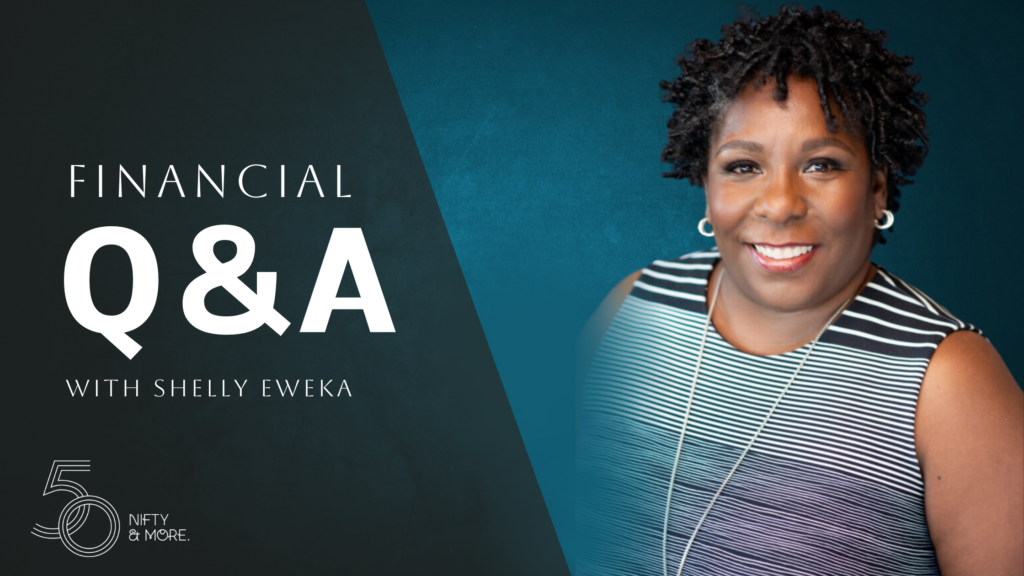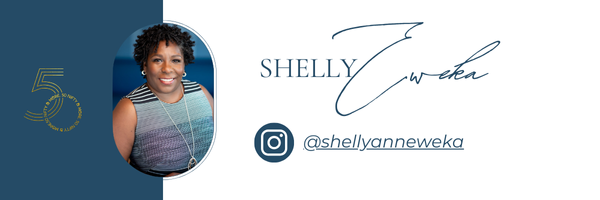WITH FINANCIAL EXPERT SHELLY EWEKA

Shelly Eweka is a nationally respected financial planning expert whose work specifically focuses on calling out and correcting racial inequities in American wealth. In our Q&A, she reveals important ways in which you can gain more control of your money to make it work harder for you.
DEFINE ESTATE PLANNING, AND EXPLAIN WHY IT’S IMPORTANT

Families need to prepare in advance so that if something happens to a loved one, your finances will be divided the way you want. If you don’t have a will, your state laws will determine how your assets are divided amongst your family. And you should determine your beneficiaries, because that trumps a will. You can have more than one beneficiary. If you have more than one child, for instance, they can all be beneficiaries.
Every time you open an account or purchase property, you’re making an estate decision. If you haven’t decided your beneficiaries, what would that mean when your family has to divide up your accounts, your life insurance, your home, your cars?
This kind of an estate plan is particularly important for the Black community to consider. There’s often a misconception that unless you’re rich, you don’t need to prepare these kinds of legal documents or draft an estate plan, but that kind of thinking is detrimental to the community. Think of your children and your family members. Whatever you own, think of how you want it to be distributed.
And if you have kids, don’t let a judge you’ve never met decide who should raise them. You should decide who will be their guardians. Setting up the appropriate legal documents can be especially important if you’re in a blended marriage. If you don’t set up the necessary legal documents, your spouse could unknowingly disinherit your children.
My friend is facing that kind of challenge. Her mother remarried someone who has four kids, but the mom never set up any estate documents, and now she has dementia. That means the stepdad could receive the inheritance and share it with only his children while cutting out my friend.
HOW TO ACCURATELY ASSESS YOUR FINANCIAL STANDING
Craft a budget that allows you to track what you earn and spend each month. You can also use an app from your financial institution, such as TIAA’s 360° Financial View. It helps you see all your accounts from TIAA and more than 17,000 other banks, brokerage firms, retirement plans and other data sources. Viewing these accounts together provides a complete picture of your finances: your net worth, your investment allocation and your total spending. In turn, you’ll see a budget that works best for you.
Some people don’t make the time to do this analysis because of all the other things on their plate. Others are afraid of what they might find out. Yes, you might be surprised at what your budget shows you. I have a friend who realized she was buying coffee each morning and going out to lunch each day, and that added up to about $100 a week. Another friend couldn’t refill a prescription at her pharmacy without also buying the latest cosmetics.
But once you know that information, you can decide whether you want to make any adjustments. You can also get a free credit report that shows your credit score and, perhaps, reveals debt you didn’t know about.
As you gather this information, it’s important to work with a financial advisor who can help you meet your short- and long-term financial needs. How to buy a house, for instance, while also repaying your student loans, saving for your kid’s college tuition, and also saving for your retirement? A financial advisor can help craft a plan that’s tailored for you. There’s not a lot of diversity among financial advisors. In fact, more than 80% of the advisors are white, but the combined total of Black and Hispanic advisors is less than 5%. If useful, you can review the Association of African American Financial Advisors.

WHAT A HEALTHY PORTFOLIO LOOKS LIKE FOR SOMEONE AGE 50+
When you’re older than 50, retirement is a major goal. But TIAA did a survey recently that showed only about a third of American workers say they’re very confident they’re on track to retire when they want, afford the lifestyle they want in retirement or live comfortably throughout retirement without running out of money.
Researchers say the biggest financial threat retirees face is that they will outlive their money. It’s called longevity risk.
People need to reframe how they plan for retirement. Many of them expect financial professionals to discuss retirement in terms of investment returns and want you to answer the question, “What magic number does my nest egg need to hit for me to retire?” Instead, you should turn that question around and ask financial professionals, “How should we plan for savings that will last the rest of my life?”
We recommend that, in general, one third of your money in retirement should come from your investments, but the other two-thirds should come from what we call lifetime income. There are three kinds of lifetime income: One is Social Security, but that’s often not enough by itself. Another is pensions, but those are becoming increasingly rare. The third is annuities, which a growing number of workplace retirement plans are including as an investment option. Annuities guard against longevity. They’re like a personal pension that gives you a source of income for life.Economists at the University of Pennsylvania and the Hebrew University of Jerusalem just published a report that describes the top 5 financial regrets of Americans over 50. The fourth regret among one-third of those older adults is they did not invest more in a lifetime annuity or similar product that would produce a guaranteed income for life.

BEST WAYS TO PAY OFF DEBT
Just evaluating your debt is a huge step in the right direction. You should NOT feel judged. Give yourself grace. Don’t focus on how you got in this position, just thank yourself for starting to get out.
Paying off debt is not easy, but there are ways to craft a strategy that will make your debt-free date come a little sooner.
TIAA has a tool, for instance, that allows you to chart your credit card debt and personal loans. You’ll see how much you owe and how much interest you’ll pay. That, in turn, helps you see which debt to pay off first.
If you’re accumulating debt, though, you need to stop. Don’t buy things if you can’t pay for them with the money in your checking/savings accounts. It goes back to crafting your budget to see what you can afford.
ADVICE RE: REVERSE MORTGAGE
A reverse mortgage is a loan where you don’t have to make payments, because the value of your home is what gets you the loan. That may be appropriate. You can get money without paying taxes. But there are several factors to consider.
What happens if you pass away? It can be expensive to repay the loan. Can your family afford that, or do they have to forfeit your home and, in turn, reduce your legacy?
I cannot emphasize this enough: before you make such a big decision, you should talk to a financial advisor – and not someone affiliated with the reverse mortgage company. Talk to the advisors who tailor plans to help meet your short- and long-term financial goals. They’re the ones who can independently help you evaluate the money this would give you, the expenses you and your family would pay and then decide whether is something that makes sense for you.

Be the first to comment